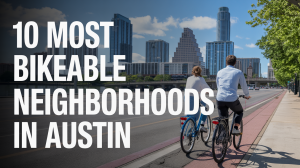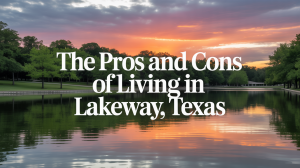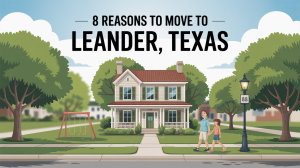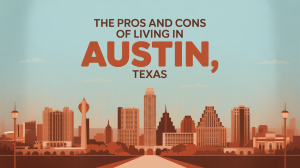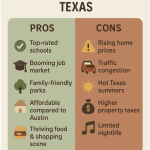Round Rock, Texas, a once-small suburb of Austin, has transformed into a bustling city in its own right. With a rapidly growing population, a thriving economy, and a reputation as the “Sports Capital of Texas,” Round Rock attracts families, young professionals, and businesses alike. However, like any city experiencing rapid growth, it faces its own set of challenges. This article explores the pros and cons of living in Round Rock, providing a comprehensive overview of what to expect when considering a move to this dynamic Texas city.
The Pros of Living in Round Rock
Strong Economy and Job Market
Round Rock boasts a robust and diverse economy, anchored by the international headquarters of Dell Technologies, which employs over 16,000 people in the area. The city has successfully cultivated a business-friendly environment, attracting a wide range of companies from technology and life sciences to manufacturing and retail. This has resulted in a strong job market with ample opportunities for professionals across various sectors. The presence of major employers like Dell, along with a growing number of small and medium-sized businesses, contributes to a low unemployment rate and a stable economic base. The Round Rock Chamber of Commerce actively promotes economic development, working to attract new businesses and support existing ones, further strengthening the local job market.
Excellent Schools
The Round Rock Independent School District (RRISD) is consistently ranked among the best in Texas. With a commitment to academic excellence and a wide range of extracurricular programs, RRISD provides a high-quality education for students from kindergarten through high school. The district’s schools are known for their strong academic performance, dedicated teachers, and innovative programs. Niche.com ranks RRISD as the #38 best school district in Texas, a testament to its quality. In addition to the public school system, Round Rock is also home to several private and charter schools, providing parents with a variety of educational options for their children.
Family-Friendly Environment
Round Rock is widely recognized as a great place to raise a family. The city offers a safe and welcoming environment with a strong sense of community. Its numerous parks, recreational facilities, and family-friendly events provide ample opportunities for families to spend quality time together. The Play for All Abilities Park is a nationally recognized park designed to be inclusive for children of all abilities, and Old Settlers Park, a 645-acre park, hosts a variety of sports and community events throughout the year. The city’s low crime rate and commitment to public safety further enhance its appeal as a family-friendly community.
Abundant Recreation and Entertainment
As the “Sports Capital of Texas,” Round Rock offers a wide array of recreational opportunities. The city is home to the Round Rock Express, the Triple-A affiliate of the Texas Rangers baseball team, who play at the Dell Diamond, a state-of-the-art stadium that also hosts concerts and other events. The city also boasts numerous sports complexes, golf courses, and parks. For those who enjoy the outdoors, the extensive trail system and nearby lakes provide opportunities for hiking, biking, and water sports. In addition to sports, Round Rock has a growing arts and culture scene, with a variety of restaurants, shops, and entertainment venues.
Proximity to Austin
One of the biggest advantages of living in Round Rock is its close proximity to Austin. Located just 20 miles north of downtown Austin, Round Rock residents can easily access all that the vibrant capital city has to offer, including its world-renowned live music scene, diverse culinary options, and major cultural attractions. This allows residents to enjoy the best of both worlds: the suburban comfort and affordability of Round Rock with the urban excitement of Austin just a short drive away.
The Cons of Living in Round Rock
Rising Cost of Living
While still more affordable than Austin, the cost of living in Round Rock has been steadily increasing. The city’s growing popularity has led to a rise in housing prices, with the average home value now exceeding $400,000. While rent prices are still below the national average, they are also on the rise. The overall cost of living in Round Rock is higher than the national average, driven by factors such as housing, transportation, and utilities. This can be a challenge for those on a fixed income or those looking for a more affordable place to live.
Traffic Congestion
Like many fast-growing cities in Texas, Round Rock struggles with traffic congestion, particularly during peak commute times. Interstate 35, the main artery connecting Round Rock to Austin, is notorious for its heavy traffic. While the city has been working to improve its transportation infrastructure, the rapid population growth has outpaced these efforts. The commute to Austin can be particularly challenging, with travel times often exceeding an hour during rush hour. This can be a major drawback for those who work in Austin but live in Round Rock.

Hot Summers
Texas is known for its hot summers, and Round Rock is no exception. The summer months can be long and brutally hot, with temperatures frequently soaring above 100 degrees Fahrenheit. The high humidity can make it feel even hotter, and the heat can be oppressive for those who are not accustomed to it. While the city has plenty of pools and splash pads to help residents cool off, the intense summer heat can limit outdoor activities and increase energy costs.
Rapid Growth and Development
The rapid growth that has fueled Round Rock’s economic success has also brought its share of challenges. The city’s infrastructure has struggled to keep up with the influx of new residents, leading to crowded schools, strained public services, and increased traffic. The once-small-town feel of Round Rock is slowly being replaced by a more urban and crowded environment. While the city is actively working to manage this growth through its Round Rock 2030 comprehensive plan, the challenges of rapid development are likely to persist for the foreseeable future.
Property Taxes
Texas has no state income tax, but it makes up for it with high property taxes. Round Rock is no exception, and homeowners can expect to pay a significant amount in property taxes each year. While these taxes fund essential services such as schools and infrastructure, they can be a major financial burden for homeowners. The combination of rising home values and high property tax rates can make homeownership in Round Rock a significant financial commitment.
Conclusion
Round Rock, Texas, offers a compelling blend of economic opportunity, family-friendly living, and suburban comfort. Its strong job market, excellent schools, and abundant recreational opportunities make it an attractive destination for families and professionals alike. However, the city’s rapid growth has brought challenges, including a rising cost of living, traffic congestion, and the strains of a burgeoning population. Ultimately, the decision to move to Round Rock depends on individual priorities and preferences. For those seeking a dynamic and growing community with a strong economy and a high quality of life, Round Rock has much to offer.
However, those who are sensitive to heat, traffic, and a rising cost of living may want to carefully consider the trade-offs before making the move. By weighing the pros and cons, prospective residents can make an informed decision about whether Round Rock is the right place for them to call home.






